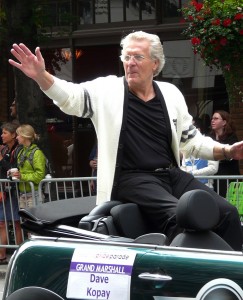You might have heard about the All-America football player who made headlines declaring he’s gay. He had struggled with family and religious conflicts, but decided he could no longer live a closeted life. He chose to come out in a pre-arranged media interview that stunned some friends and fellow athletes. The ensuing chorus of cheers and boos included remarks from players expressing shame at having nakedly shared a locker room with him.
What would it have been like if they’d had Twitter and Facebook back then? I asked 71-year-old Dave Kopay on the telephone last week.
“I probably would have heard a lot worse than I did,” said the former University of Washington running back and the first professional athlete to openly declare, after his playing days, that he was homosexual. “Obviously, before the Internet, there weren’t as many media outlets. I did just one major interview, with David Susskind. It was great. I never felt more at peace in that big, dark TV studio.”
That was in 1975, three years after the 6-foot, 220-pound ex-Husky ball carrier had retired from nine seasons in the NFL. He contacted Lynn Rosellini, then a journalist at the since-folded Washington Star (and the daughter of Gov. Al Rosellini), who did the reveal: The respected pro who ran the ball and returned kicks for five teams including the 49ers, Packers, and Redskins (where his lover was teammate Jerry Smith) announced he is, was, and always will be gay. He followed up with the publication of his tell-all best-seller, The David Kopay Story, describing a struggle to play it straight in a queer body. He underwent psychotherapy and hypnosis in hopes of finding a cure, then realized he wasn’t sick. When he let the nation know his secret, he told me, he was overwhelmed by the acceptance he received from former teammates and coaches.
“I’m a lot older and more emotional today,” said Kopay from his home in Los Angeles, which he plans, upon his death, to donate to the UW as part of his $1 million pledge in cash and holdings to the university’s Q Center, a help haven for lesbian, gay, bisexual, and transgender students and staff. “And when I think of the support I’ve gotten”—he pauses—“I tear up. Sorry.”
The uproar from Kopay’s sexual declaration almost 40 years ago is the forerunner of the ongoing ruckus over Michael Sam’s similar announcement. If the University of Missouri defensive lineman becomes, as expected, a middle-round pick in the May NFL draft, he’d be the league’s first openly gay active player.
Like Kopay, he’s an All-American, announced his homosexuality through media interviews, and had to deal with family prejudices. (Sam’s father told a reporter, “I’m old-school. I’m a man-and-a-woman type of guy,” later claiming he was misquoted.) Likewise, New Orleans linebacker Jonathan Vilma said what some players said when Kopay came out: “Imagine if he’s the guy next to me and, you know, I get dressed, naked, taking a shower, the whole nine, and it just so happens he looks at me. How am I supposed to respond?”
Kopay laughed at that one. “What rock has he been living under? There were other gays in the NFL when I played, they’ve been there since, they’re there today. Respond like you always have. They’re your teammates.”
Raised in a Catholic family in Chicago and then L.A., Kopay had been attracted to males as a teen and secretly dated men throughout his college days. It was a persistent charade that required he also date women. He remembers a great week before the 1964 Rose Bowl, when, as Husky co-captain, he escorted the Rose Queen around Los Angeles while he was dating a UW fraternity brother. (The love of his life, as Kopay called him, was later killed in Vietnam.)
In Kopay’s view, San Francisco and Seattle would be the more receptive teams and cities for Mizzou’s gay lineman. Malcolm Smith, the Seahawks Super Bowl MVP, has already sent a welcoming tweet, saying to those who might object, “There is no room for bigotry in American sports.” Seattle fullback Michael Robinson seems wary, however. “If a guy sees you hanging with a guy like that, I mean, I don’t know,” he told NFL.com. “It’s different. I feel like this is just a game-changer.”
Kopay says he didn’t expect to change the world in 1975, but feels gay rights and acceptance have leaped forward in the last decade. Attitudes like Robinson’s are “just ignorance,” he says. Seattle Coach “Pete Carroll’s influence and power and the way he’s managed that team, I think, suggest he’d quickly deal with that nonsense.”
As for Sam, whom Kopay met at an L.A. dinner party last week, he should just be himself, Kopay wrote in an open letter on OutSports.com. But “when it comes to the NFL Combine and then training camp: You need to bring it like you have never brought it before.” In other words, if you’re going to be a trailblazing player everyone will be watching, be sure you make the freakin’ team.
randerson@seattleweekly.com
Journalist and author Rick Anderson writes about crime, money, and politics, which tend to be the same thing.








